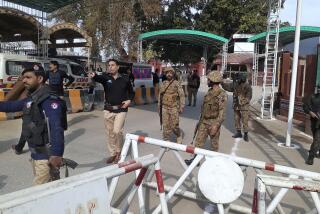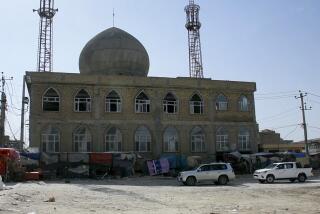Bombers Kill 80 in Two Iraqi Mosques
- Share via
BAGHDAD — Two suicide attackers simultaneously detonated bomb vests inside a pair of Shiite Muslim mosques in an Iraqi town near the Iranian border Friday, killing at least 80 people and injuring 150.
The attacks in the largely Kurdish community of Khanaqin were the deadliest by insurgents since Sept. 29, when a series of blasts killed 95 people in Balad, another city north of Baghdad.
The explosions shattered the Sheik Murad and Khanaqin Grand mosques during midday prayers, raining bricks onto worshipers below. Most of the casualties occurred at the larger Khanaqin Grand Mosque. The two houses of worship stood at opposite ends of the town’s open-air market.
“For more than three hours and even now, the dead are being lifted from under the rubble by police, the army and the civil defense men,” said Ibrahim Ahmed Bajilan, the governor of Diyala province. About 90% of the worshipers in the mosques were killed, Bajilan said.
The attacks in Khanaqin came less than five hours after a pair of suicide bombings outside a Baghdad hotel that served as a base for many Western journalists working in Iraq. Those blasts killed eight people and injured more than 20.
In Khanaqin, Sirwan Ismael, 25, said he had been preparing for prayers at the venerable Khanaqin Grand Mosque when a suicide bomber entered the prayer hall and set off his explosives.
“I felt a strong bomb, and I was injured from debris that fell on me,” Ismael said. “It felt like a typhoon wrecked the place. I couldn’t see after that easily because of the dust that spread everywhere.
“I ran without knowing where I was going. I saw other people running, weeping, complaining of the pain, dead on the ground.”
Moisen Ali Ahmed, a young mosque volunteer, was approaching the facility for Friday prayers when the bomb exploded.
“I tried to get inside, but I couldn’t because there was too much dust and rubble,” Ahmed said. “The people I tried to save told me that someone had exploded himself inside, near the front of the crowd of worshipers.”
Ahmed said the victims “have nothing to do with politics. They are simple, ordinary people.”
Khanaqin is a hilly, predominantly Kurdish town 90 miles northeast of Baghdad in a largely Sunni province. Although it is south of Kurdistan, the city of 50,000 is a stronghold of the Patriotic Union of Kurdistan, one of Iraq’s most influential political parties.
The group is the force behind a campaign to push out Sunni Arabs who had taken over the properties of many ethnic Kurds under the Sunni-dominated regime of Saddam Hussein. In recent months, residents have had discussions with Kurdish leaders about annexing their town to semiautonomous Kurdistan.
“That’s an ongoing issue,” said U.S. Army Maj. Steven Warren, a spokesman for the 3rd Brigade Combat Team, which patrols the area.
“It depends where you stand on the issue. If you’re a Kurd, the PUK is repatriating their own people who had been cleared out by Saddam Hussein. Or if you’re a Sunni Arab and being ejected out of there, you just feel like you’re getting pushed out of your home.”
Warren said Sunni Arabs in the area also were angry about last week’s joint offensive by U.S. troops and Iraqi police commandos in Baqubah, also northeast of Baghdad and about 60 miles away from Khanaqin. The Iraqi government’s Wolf Brigade arrested at least 360 people in the raid, including local Sunni Arab officials.
As of Friday night, no insurgent groups had taken responsibility for the mosque bombings.
Although there have been occasional assassinations and small bomb attacks in Khanaqin, the area had been spared heavy casualties since January, when a suicide bomber targeted U.S. troops. The blast killed five Iraqi civilians but not Americans.
“Khanaqin is considered a safe place, and it suffered a lot during Saddam Hussein’s time,” said Mohammed Mula Hassan, Khanaqin’s mayor.
“The bombers definitely came from outside the city. They are aiming to create problems between Sunni and Shiite Muslims by such acts.”
Dr. Kamiran Ahmed Mahdi, the manager of Khanaqin Hospital, said his facility was overwhelmed and the morgue filled to capacity. “There are still 15 bodies there and nobody has yet come to receive them,” Mahdi said.
The doctor saw a political motive behind the attacks.
“I think they did this because we have been talking about annexing Khanaqin to the Kurdish region,” he said.
According to Associated Press, suicide bombings have killed at least 1,617 Iraqis and wounded 3,429 since the interim Iraqi government took power in April.
More to Read
Sign up for Essential California
The most important California stories and recommendations in your inbox every morning.
You may occasionally receive promotional content from the Los Angeles Times.













